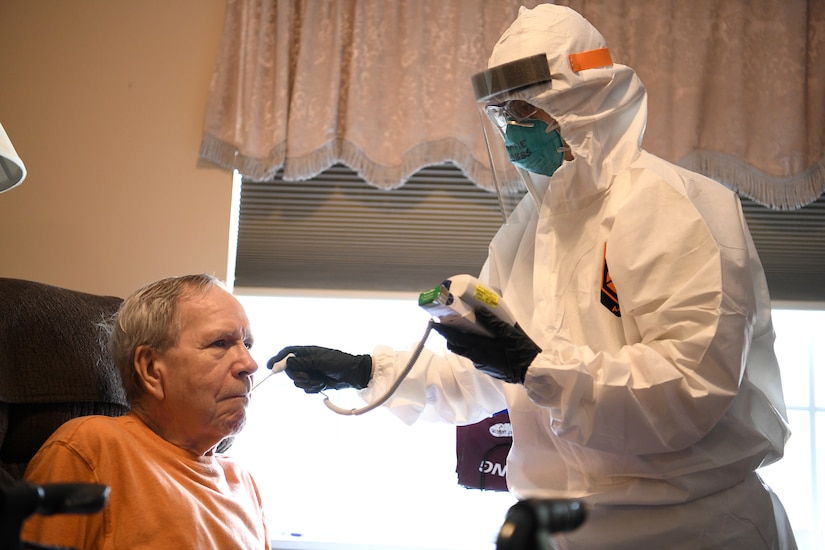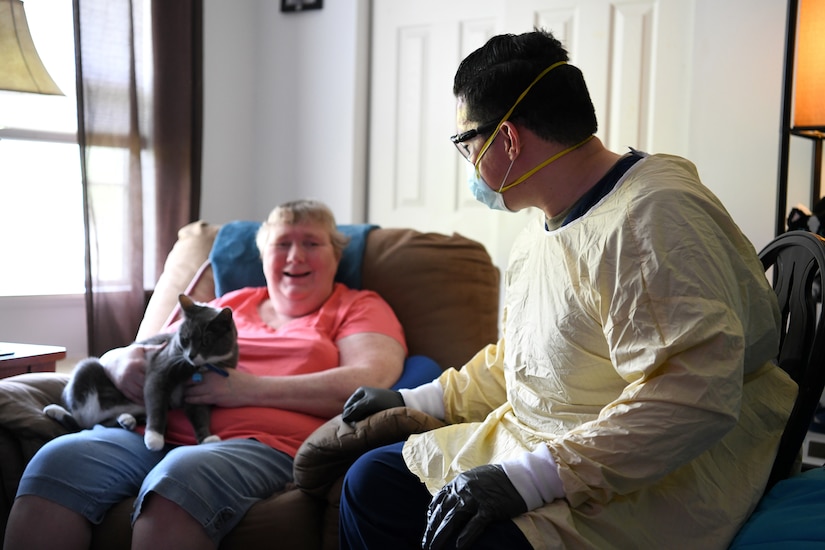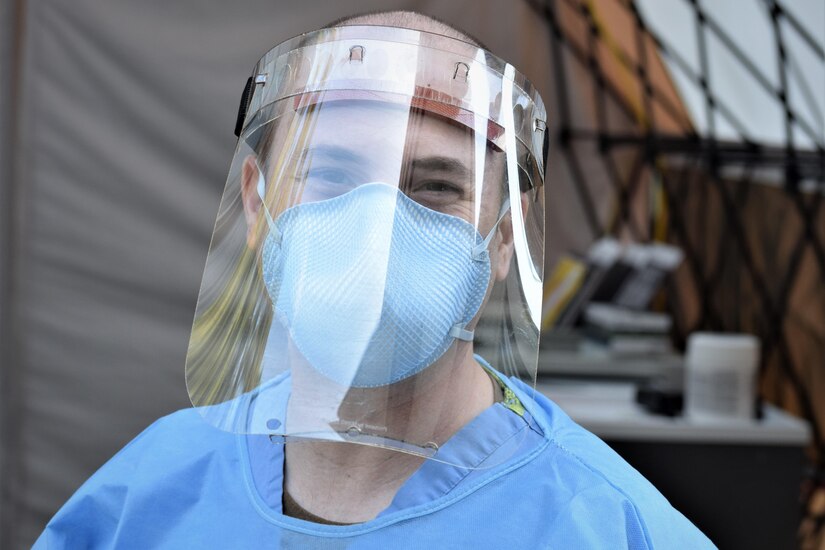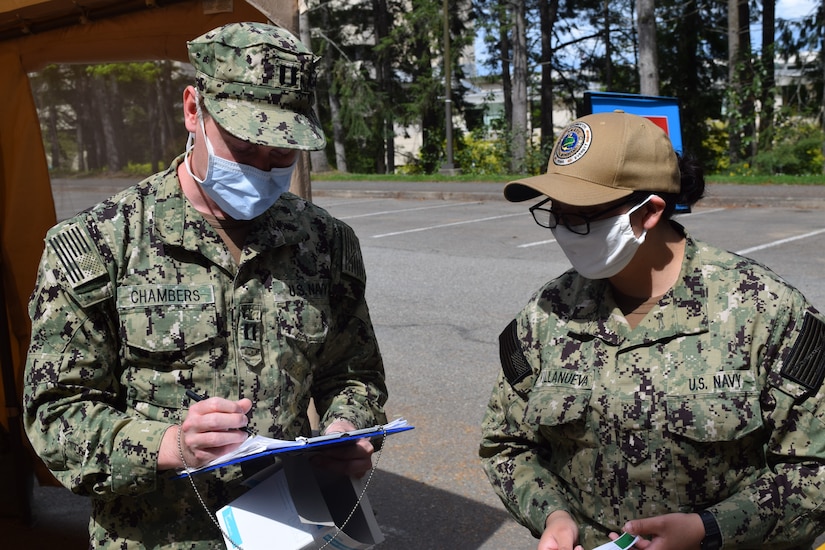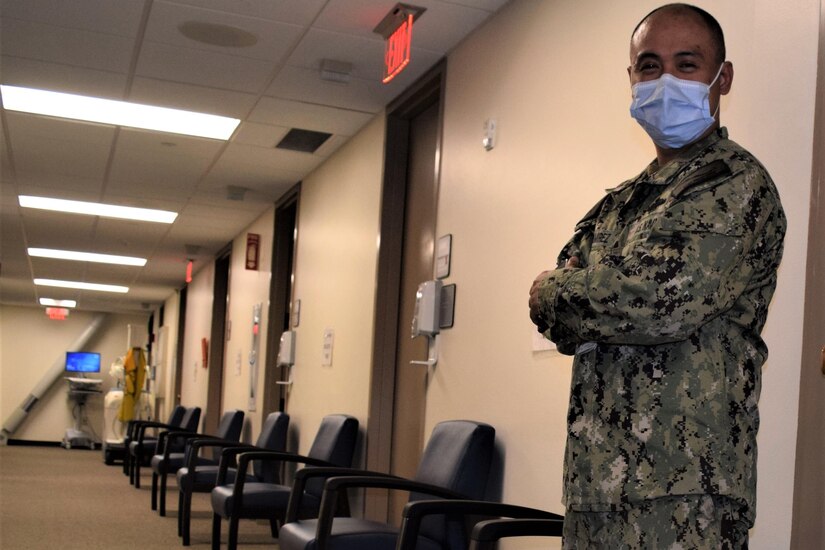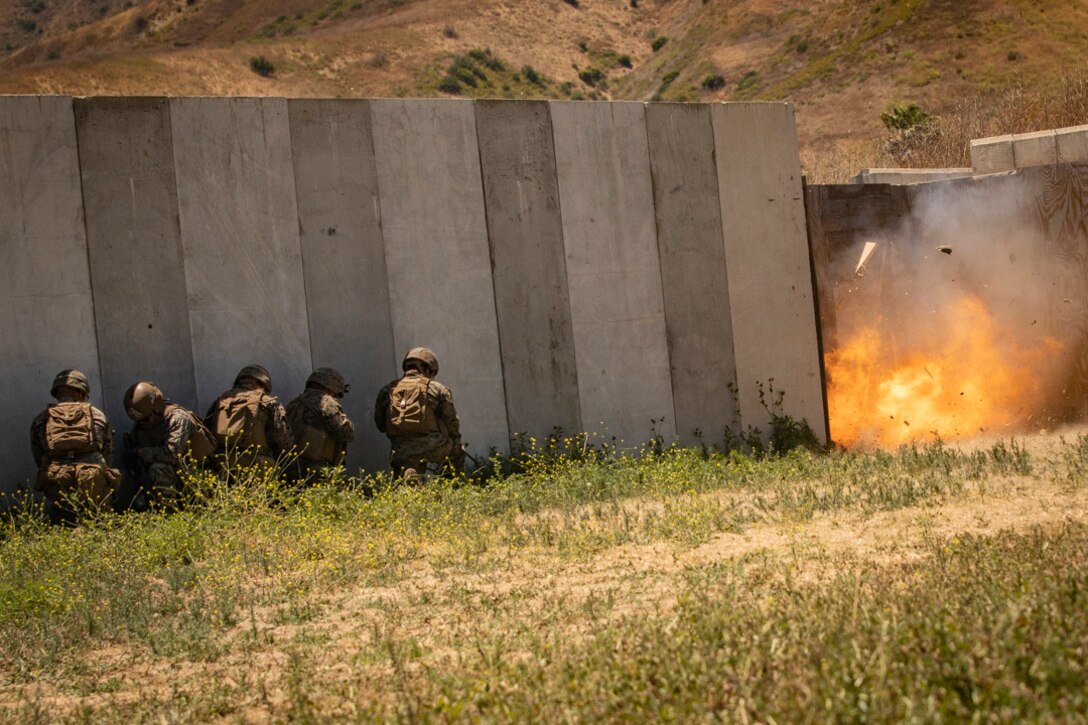![]() July 8, 2020
|
BY AIR FORCE STAFF SGT. AMBER MULLEN
July 8, 2020
|
BY AIR FORCE STAFF SGT. AMBER MULLEN
Two months after the novel coronavirus began spreading throughout
Ohio, a team of 20 airmen and soldiers was activated to help in caring
for residents at an assisted living facility that was being overwhelmed
by the virus.
After residents and staff began experiencing COVID-19 symptoms,
Carlin House Assisted Living directors Mindy and Chad Bailey decided to
advocate for facilitywide testing. The testing revealed that nearly 65%
of the residents and 37% of the staff had contracted COVID-19.
As fears began to rise, many of the staff chose to self-quarantine.
With only six nurses remaining on the team, the facility was on the
brink of a crisis.
Rather than displacing residents to alternate facilities, the Baileys
decided to shelter in place and reach out to the Ohio National Guard
for additional support and resources. Within six hours of receiving the
call, the Ohio National Guard dispatched a 20-person team with medical
and ancillary staff capabilities.
The guard’s medical staff consisted of medics and nurses who were
responsible for tasks such as administering medications, assessing
conditions, taking vital signs and transferring residents throughout the
facility. The ancillary staff provided support through cleaning,
laundry services, delivering meals and assisting trained medical
personnel with resident care needs.
Once they arrived on scene, the guardsmen were oriented to the
facility, situation and the residents. The members worked to cordon off
wings of the facility based on which residents tested positive for
COVID-19. They then created an internal protocol that included personal
protective equipment for each section. The PPE protocol was instrumental
in promoting safety and decreasing cross-contamination between those
who had tested positive for COVID-19 and those who had not.
The guardsmen valued interacting with and learning from their
civilian counterparts about the facility and residents. The assisted
living facility staff provided the team with valuable input on their
operations and residents' care needs. These needs varied greatly from
resident to resident.
There's not enough words to express our gratitude that they are
taking care of our residents how we would, and how they deserve to be
taken care of.''
Chad Bailey, co-director, Carlin House Assisted Living
''They've helped me by serving my meals, with personal care and just
being there for me,'' said Kathy Russell, a resident at the Carlin House
Assisted Living. ''They’ve been very good to us. They stepped in and
stepped up greatly to be here and to take care of us. They've done a
great job, and I am thankful for them.''
While the work environment was unique to the guardsmen, who typically
train to operate in a tactical and combat medicine environment, many of
them were able to draw from their military and civilian experiences to
provide professional care for the residents.
Army Maj. Richard Binks, a registered nurse with the Ohio Army
National Guard Medical Detachment, was no stranger to working with
patients who had contracted COVID-19. Binks had worked with COVID-19
patients in his civilian job as an intensive care unit nurse and for his
mission assignment in April caring for inmates at the Federal
Correctional Institution in Elkton, Ohio.
''I think [my experience there] prepared me for this because I have a
better understanding of the proper PPE to use, what precautions and
prevention methods to take, the overall understanding of how COVID-19
can present, knowledge of the interventions being done for patients with
COVID-19 and knowledge of the treatment plans for COVID-19 positive
individuals,'' Binks said.
All members of the team played an instrumental role in providing the
residents with companionship and assessing their mental and emotional
well-being during the quarantine. Their mental and emotional well-being
is parallel in importance to their physical well-being during this
crisis. Simply keeping the residents in good spirits is what the
guardsmen aimed to do.
''I've seen their demeanor, and I've heard the compassion in their
voices as they speak to and take care of our residents,'' said Chad
Bailey, one of two directors of Carlin House Assisted Living. ''There's
not enough words to express our gratitude that they are taking care of
our residents how we would, and how they deserve to be taken care of.''
During their time at the assisted living facility, the guardsmen also
experienced the unfortunate reality that the virus can be fatal.
Through this experience, a services airman who was part of the ancillary
staff was able to take the lead in providing mortuary affairs services
for the residents who had died.
''When a resident passes, I treat them as if they were my family
members,'' said Air Force Airman 1st Class Chelsea Winteringham, a
services airman with the Ohio Air National Guard's 179th Airlift Wing.
''It's tough at first, but then you realize you're doing it to respect
the deceased and their family members.''
Although their time together was only two weeks, the death of a
resident can take a toll on the guardsmen who performed the mission. The
guardsmen formed personal connections with the residents and got to
know each of them on an individual level. During a daily meeting,
members had the opportunity to talk to the group about how they were
feeling and were able to look to one another for support.
''[The Ohio National Guardsmen were all] very caring and receptive to
understanding how the residents are feeling, how the families are
feeling, and how we as staff members are feeling,'' said Mindy Bailey,
one of two directors of Carlin House Assisted Living. ''They are more
than just responding to a crisis. They were completely engaged in the
entire body, mind and soul of the entire mission.''
(Air Force Staff Sgt. Amber Mullen is assigned to the 178th Wing.)
